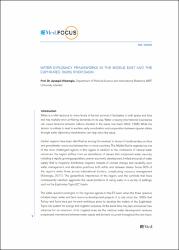Please use this identifier to cite or link to this item:
https://hdl.handle.net/20.500.11779/1307Full metadata record
| DC Field | Value | Language |
|---|---|---|
| dc.contributor.author | Kibaroğlu, Ayşegül | - |
| dc.date.accessioned | 2020-02-25T07:32:19Z | |
| dc.date.available | 2020-02-25T07:32:19Z | |
| dc.date.issued | 2020 | - |
| dc.identifier.citation | Kibaroğlu, A. (2020). Water diplomacy frameworks in the Middle East and the Euphrates-Tigris river basin, Annual Conference IEMed. Barcelona, pp. 1. | en_US |
| dc.identifier.uri | https://hdl.handle.net/20.500.11779/1307 | - |
| dc.identifier.uri | http://bit.ly/2SZN685 | - |
| dc.description.abstract | Water is a vital resource to many levels of human survival; it fluctuates in both space and time and has multiple and conflicting demands on its use. Water crossing international boundaries can cause tensions between nations situated in the same river basin (Wolf, 1998). While the tension is unlikely to lead to warfare, early coordination and cooperation between riparian states through water diplomacy mechanisms can help solve the issue. Certain regions have been identified as among the weakest in terms of transboundary surface and groundwater resources between two or more countries. The Middle East is regarded as one of the most challenged regions in this regard. In addition to the constraints of natural water resources, the region suffers from an abundance of issues that compound water security, including a rapidly growing population, uneven economic development, limited amounts of water supply that is irregularly distributed, negative impacts of climate change and variability, poor water management, and allocation practices both within and between states. Some 60% of the region’s water flows across international borders, complicating resource management (Kibaroglu, 2017). The geopolitical importance of the region, and the conflicts that have consequently resulted, aggravate the usual problems of using water in a variety of settings, such as the Euphrates-Tigris (ET) basin. | en_US |
| dc.language.iso | en | en_US |
| dc.publisher | European Institute of the Mediterranean (IEMed) | en_US |
| dc.relation.ispartof | Annual Conference IEMed | en_US |
| dc.rights | info:eu-repo/semantics/openAccess | en_US |
| dc.subject | Water Diplomacy | en_US |
| dc.subject | Middle East | en_US |
| dc.subject | Euphrates-Tigris River Basin | en_US |
| dc.title | Water Diplomacy Frameworks in the Middle East and the Euphrates-Tigris River Basin | en_US |
| dc.title.alternative | 160. Water diplomacy frameworks in the Middle East and the Euphrates-Tigris river basin | en_US |
| dc.type | Conference Object | en_US |
| dc.authorid | Ayşegül Kibaroğlu / 0000-0002-9648-5975 | - |
| dc.relation.publicationcategory | Konferans Öğesi - Uluslararası - Kurum Öğretim Elemanı | en_US |
| dc.identifier.endpage | 1 | en_US |
| dc.identifier.startpage | 1 | en_US |
| dc.department | İİSBF, Siyaset Bilimi ve Uluslararası İlişkiler Bölümü | en_US |
| dc.institutionauthor | Kibaroğlu, Ayşegül | - |
| item.grantfulltext | open | - |
| item.fulltext | With Fulltext | - |
| item.languageiso639-1 | en | - |
| item.openairetype | Conference Object | - |
| item.openairecristype | http://purl.org/coar/resource_type/c_18cf | - |
| item.cerifentitytype | Publications | - |
| crisitem.author.dept | 04.04. Department of Political Science and International Relations | - |
| Appears in Collections: | Siyaset Bilimi ve Uluslararası İlişkiler Bölümü Koleksiyonu | |
Files in This Item:
| File | Description | Size | Format | |
|---|---|---|---|---|
| Ayşegül Kibaroğlu.pdf | Yayıncı Sürümü _ Konferans Dosyası | 120.77 kB | Adobe PDF |  View/Open |
CORE Recommender
Items in GCRIS Repository are protected by copyright, with all rights reserved, unless otherwise indicated.